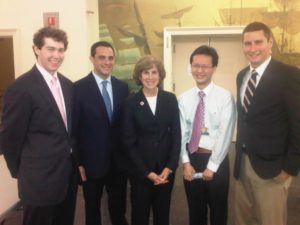 Often I get asked to speak at events outside of the Red Cross. Last week I had the privilege of speaking at the Milton S. Eisenhower Symposium at Johns Hopkins University. Since I graduated from JHU in 1974 with the first class of female students, and my daughter is a student there now, I jumped at the opportunity.
Often I get asked to speak at events outside of the Red Cross. Last week I had the privilege of speaking at the Milton S. Eisenhower Symposium at Johns Hopkins University. Since I graduated from JHU in 1974 with the first class of female students, and my daughter is a student there now, I jumped at the opportunity.
The symposium is an excellent student-run event that brings in an eclectic group of speakers, like Jerry Springer, Michael K. Williams from “The Wire,” and Obama advisor David Axelrod. The speakers are asked to “address the various strides America must take to strengthen its position in the global landscape and catapult the world towards the future.”
When I read the speech topic, I thought, “What an unbelievably daunting topic.” So I decided to share with the students the lessons I’ve learned since working for the Red Cross in hopes that it would encourage them as they contemplate their own futures.
The first lesson I described is that working for the Red Cross has restored my faith in humanity. If you turn on the television today, you’ll hear a lot of bickering and pessimism. But I’m here to tell you that there are wonderful, giving, selfless people in our country, supporting the American Red Cross and other worthy causes. For example, while visiting a blood bank, I met a man in the process of giving his 49th gallon of blood. Yes, I said gallon – that’s a true act of life-saving generosity. In Joplin, I met a woman who had lost everything but was still volunteering in our shelter. After the earthquake struck Haiti, a seven-year old sent me a crumpled up dollar bill that he got from the tooth fairy and asked me to send it to the people of Haiti.
There are so many ordinary people walking the streets who have performed extraordinary acts. They are my heroes, and I’m grateful to them for showing me that the future is actually bright.
The second lesson I’ve learned is that you’re never too old to reinvent yourself. I call myself a 59-year-old work in progress. I told the students that if you find yourself in a situation in which you don’t like what you’re doing, you can try something else. You can course correct at any time. I worked for almost three decades in the corporate world and then about six years in academia before I moved to the Red Cross. You can always make changes, and when you achieve your dreams, you can always have new ones.
Lastly, I told these bright, delightful students that we are so privileged to live in this country. When I first visited Haiti after the disaster, there were still corpses on the ground. There were people walking around with horrific wounds. Even before the earthquake, an estimated 2.5 Haitians in 10,000 had never seen a doctor. A projected three quarters of the people in Haiti didn’t have electricity. One in three Haitians lacked access to safe municipal water. This was all before the earthquake. I feel fortunate to live in a country with infrastructure and services that I often take for granted. That’s why when one student asked me how to blend passions for both the corporate and non-profit worlds I told him to always be involved in giving. There’s nothing as delicious as giving back. Whether it’s your time, your talents, your money or even donating blood.
What a treat it was to spend time with some of the future leaders of our country. I left the symposium feeling encouraged about our future.
